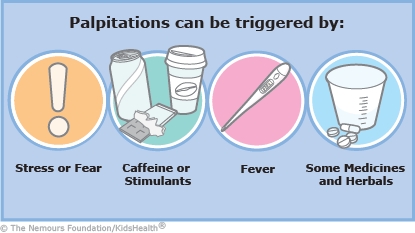Palpitations are a feeling that the heart is beating faster, harder, or with a different beat than usual. Your child may feel like their heart is skipping beats. Palpitations usually aren't a sign of a health problem, and most kids who have them won't need to limit their physical activity. Rarely, palpitations happen because of a heart problem. If this is a concern, a heart specialist will check your child and order testing.



Your child:

Your child:

What are other symptoms of palpitations? Kids who have palpitations might describe a pounding, racing, skipping, fluttering, or "flip-flop" feeling in the chest. Younger children may say that their heart is "beeping." Parents may notice that a child's heart seems to be beating fast when holding the child close.
What does it mean if a child has palpitations? Usually, palpitations are not related to a heart problem. But in a few kids, they might be a sign of a problem with the way the electric signal travels through the heart or how the heart is pumping. Health care providers check carefully for these problems in kids with palpitations.
How do health care providers diagnose palpitations? Health care providers will ask about what a child was doing when the palpitations happened, listen to the child's heart, and may order an EKG (electrocardiogram). An EKG is a quick, painless test that measures the heart's electrical waves to see how it's working. Sometimes a portable heart monitor is used to check a child's heartbeat for 24 hours.